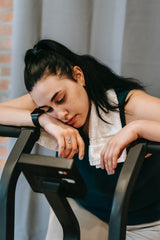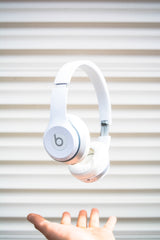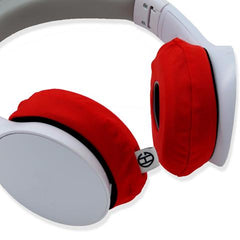Working Out on Zero Sleep: Is It Worth It?

According to the NHS, the average person should aim to get between six and nine hours of sleep each night. The National Sleep Foundation in the United States suggests somewhere between seven and nine. Quality rather than quantity is, of course, important too, but it can sometimes be tough to balance a healthy sleep schedule alongside a regular morning gym routine. But should sleep take priority or is it better to slog through exercise even when you’re still half asleep?
The importance of sleep and exercise cannot be overstated and yet as a society, we’re told that, on the whole, we’re getting fewer hours of it each night. And we’ve all been there. We all know that a lack of sleep can make us feel pretty damn shitty the next morning. It’s hardly surprising when you consider that sleep is something of a miracle worker, helping in the rest, recovery and repair of our bodies and brains.
Leading Neuroscientist and author of the book Why We Sleep, Matthew Walker told The Guardian last year that poor sleep can be linked with Alzheimer's, cancers, diabetes, obesity and poor mental health. Poor sleep cost the UK economy £40 billion in 2016 and despite society treating sleeplessness as a necessary, boast-worthy ‘badge of honour’, it’s actually really rather bad for us. Life-limiting, in fact, if you agree with Matthew Walker. It seems counter-intuitive, then, to spend half our lives working out, getting faster, fitter, stronger and healthier in the gym if we’re going to neglect the one thing that could negate all that effort: sleep. And what’s more, there’s no monthly membership for sleep, no intensive dieting or time-consuming effort - for many of us, it’s the easiest thing in the world to do OR at least it should be.

There’s no unified answer on what the impact of sleeplessness is on exercise but there does appear to be a general consensus amongst many researchers that sleep is an important function and that a lack of it can hinder our physical exercise routines. It’s hardly a stretch to understand why this might be. We’ve all had late nights, struggling to pull ourselves into school or work the next day. We struggle mentally and physically when we’re tired, so it makes sense that this can follow us into the gym, too.
One small study seeming to confirm this was conducted by the Stanford University Sleep Disorders Clinic and Research Laboratory who studied five women on the university’s tennis team. Over a two to three week period, the women did nothing different to their usual training and lifestyle regimes. Researchers watched and recorded the results of the women in sprinting and hitting drills, measuring the women’s performance appropriately. The players were then told to increase their sleep to ten hours a night for six weeks. After this, researchers saw an increase in speed and hitting accuracy. The New York Times blog commented that some of this may be attributed to increased practice time, but it seems likely that at least some of this improvement was down to an increased time spent sleeping.
Sleep deprivation may also make you slower, according to a study described by LifeHacker Vitals. They were referring to results published in the European Journal of Applied Physiology, where men who’d stayed up all night ran a ‘slightly shorter distance’ during a 30-minute test on the treadmill. This was compared to when they’d run well rested.
In a third study, researchers from the American College of Sports Medicine recorded the results of 12 men who performed a range of physical and mental tests following a good nights sleep and then again after the men had zero sleep. The results showed that the men performed better when they’d had a restful night.
It does make sense that the fug of sleeplessness follows us into the gym. There’s certainly enough stimulants - legal and otherwise - in the fitness industry brewed or sold to help counteract this: caffeine to boost your performance or using music to help increase your effort but training when tired does make things feel more difficult and more taxing.
(If you are using music to help boost your training, then remember to protect your headphones with EarHugz sweat-proof headphone covers)
Maybe it’s specific to certain sports? LifeHacker wrote about the difference in the type of exercise or sport that you’re taking part it after a period of sleeplessness. Originally published in Physiology and Behaviour journal, it suggested that in aerobic sports there was little difference between performing well rested or not. It was in sports such as weightlifting, or where decision making was involved, or in “high vigilance” sports that there was a noticeable difference and that it was more likely that mistakes would be made. So if you’re feeling tired then maybe it’s better to hit the running track or the treadmill rather than the weights.
There’s also the effect that sleeplessness can have on concentration and coordination, too. If you’re not able to focus on your workout - whatever that may be - then your form is probably going to suffer, putting you at a greater risk of injury.
The ACSM study mentioned above also concluded that exercising on a lack of sleep often led to poorer athletic performance because the mind gave up sooner than the body did.
Sleep loss has an impact at a biochemical level, too. Poor sleep patterns raise cortisol levels, leading to a negative impact on the body’s immune system and making it more likely that you’ll pick up that cold or virus doing the rounds at the gym or studio.
Cortisol can also interfere with and inhibit the body’s ability to repair tissue.

Sleep impacts our diet, too. After all, health and fitness are just as much about what’s going on in the kitchen as much as in the gym. Shape.com makes a startling comparison: 35% of people are believed to suffer from sleep deprivation and that statistic is almost identical to the number of people suffering from obesity. Sleep loss won’t just affect your performance in the gym or on the track but in your eating habits, too. Shape goes on to reveal the results of a study originally published in the Annals of Internal Medicine in which a group of dieters were put on different sleeping schedules. Those who were well rested lost more fat than those who weren’t. The diets were the same, and the group that had less sleep felt hungrier more frequently and lacked the energy to exercise. The University of Chicago even has a term for what lack of sleep can do to our bodies ability to burn fat: Metabolic grogginess. This term is used alongside another than you may be familiar with: sleep debt. Sleep debt is what happens when sleeplessness rolls over a number of nights. You can fall into a situation where you are unable to catch up on the hours you’ve lost and so feel tired for longer. Metabolic grogginess was coined to describe what happens when that sleep debt crosses into four days: when the body’s ability to manage insulin is out of whack and insulin sensitivity drops by 30%.
This is bad news for dieters or anyone managing their weight.
And it gets worse.
A 2010 article in the journal "Best Practice and Research: Clinical Endocrinology and Metabolism." suggested that sleep loss can decrease the body’s leptin levels. Leptin is the hormone that makes you feel full up. So you’ll feel hungrier faster and more often when it's reduced. A lack of sleep will also increase levels of ghrelin which is the hormone responsible for appetite. Tie these in with the obvious decrease in energy and motivation levels, you can see why the link between sleeplessness and obesity is so compelling.
Modern society doesn’t make it easy on us. The invention of the electric light has given us perpetual daytime. We don’t need to surrender to the dark as our ancestors did, and our bodies aren’t yet adapted to dealing with it. The odd late night isn’t going to ruin your gym routine or your diet but it’s an interesting exercise to examine your sleeping patterns and look at how quickly or easily you explain away fatigue.

But working out on zero-sleep: is it worth it?
Probably not.
Your concentration will be off. Your workout will probably feel tougher. If you’re using equipment, then it may very well be dangerous, too. Skipping the gym because you’re exhausted is not the same as being lazy. It’s not going to undo weeks or months or effort, and you may well end up feeling better for it.
Ideally, you won’t hit the gym on anything fewer than seven hours of sleep but that’s not always realistic. Shannon Fable, director of exercise programming at national gym chain Anytime Fitness, told Shape Magazine that if you’ve regularly been getting 6 hours or less nights sleep then it’s time to ‘re-think the exercise schedule’ She suggests looking to fit your gym workout in on a lunch break or at another time of the day if you’re not a morning person. If you were up all night, she says to skip the gym entirely.
This might seem difficult but the links between serious chronic illness and sleep deprivation suggest that you deserve to seriously consider how best to balance your sleep schedule and fitness.
If you’re tired because you had a big night out or you're hungover, then it’s OK to skip the gym that day. You can’t sweat a hangover out contrary to popular belief, anyway.




